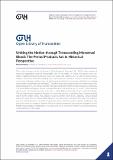Files in this item
Uniting the nation through transcending menstrual blood : The Period Products Act in historical perspective
Item metadata
| dc.contributor.author | Bildhauer, Bettina M | |
| dc.date.accessioned | 2021-12-23T13:30:10Z | |
| dc.date.available | 2021-12-23T13:30:10Z | |
| dc.date.issued | 2021-12-22 | |
| dc.identifier | 276567149 | |
| dc.identifier | 3164c1e4-c2d6-458a-a925-2e9e65cbd1cb | |
| dc.identifier | 000735750500007 | |
| dc.identifier | 85125467918 | |
| dc.identifier.citation | Bildhauer , B M 2021 , ' Uniting the nation through transcending menstrual blood : The Period Products Act in historical perspective ' , Open Library of Humanities , vol. 7 , no. 2 . https://doi.org/10.16995/olh.6339 | en |
| dc.identifier.issn | 2056-6700 | |
| dc.identifier.other | ORCID: /0000-0003-1055-9441/work/105318196 | |
| dc.identifier.uri | https://hdl.handle.net/10023/24571 | |
| dc.description | The research for this work was funded by the Royal Society of Edinburgh’s Arts and Humanities Research Network Grant 64992. | en |
| dc.description.abstract | This article sets the Period Products (Free Provision) (Scotland) (2021) Act in the context of historical imaginations both of menstruation and of the nation. It shows that despite the law-makers’ stated intentions, traditional menstrual stigma still underlies the Act and its parliamentary debates. This allows politicians speaking about menstruation to distance themselves from those who menstruate, claiming a position as part of a privileged, authoritative community, and associating menstruation further with being underprivileged. The article shows how deep and pervasive the roots of this stigmatising pattern are, tracing it back to premodern and early modern humoral medicine, specifically to Pseudo-Albertus Magnus’ Secreta mulierum (The Secrets of Women), and to modern fiction directly discussed in the Scottish parliament: the film I, Daniel Blake and Alasdair Gray’s novel Poor Things. The parliamentarians, moreover, imagine the bonds created by speaking about menstrual blood as extending to the whole nation. They implicitly understand the nation to be united by a shared blood and at the same time as transcending blood, in this case menstrual blood. This tacit conception is part of a historical pattern of similar imaginations of the Scottish nation in relation to blood, as this article will show in a sample of Scottish historical, fictional and political writing and thought from the Middle Ages to today. Menstruation in this way turns out to be central to historical and contemporary understandings of citizenship. | |
| dc.format.extent | 30 | |
| dc.format.extent | 430397 | |
| dc.language.iso | eng | |
| dc.relation.ispartof | Open Library of Humanities | en |
| dc.subject | Menstruation | en |
| dc.subject | Scotland | en |
| dc.subject | Period products | en |
| dc.subject | Theories of the nation | en |
| dc.subject | Nation | en |
| dc.subject | DA Great Britain | en |
| dc.subject | KDC Scotland | en |
| dc.subject | T-NDAS | en |
| dc.subject.lcc | DA | en |
| dc.subject.lcc | KDC | en |
| dc.title | Uniting the nation through transcending menstrual blood : The Period Products Act in historical perspective | en |
| dc.type | Journal article | en |
| dc.contributor.sponsor | The Royal Society of Edinburgh | en |
| dc.contributor.institution | University of St Andrews. German | en |
| dc.identifier.doi | 10.16995/olh.6339 | |
| dc.description.status | Peer reviewed | en |
| dc.identifier.grantnumber | 64992 | en |
This item appears in the following Collection(s)
Items in the St Andrews Research Repository are protected by copyright, with all rights reserved, unless otherwise indicated.

